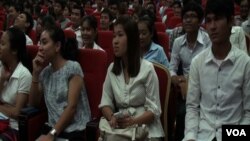Human rights leaders in Cambodia say more Cambodian youths need to be engaged in the country’s politics.
Speaking at a youth forum in Phnom Penh over the weekend, where some 700 students gathered, Pung Chhiv Kek, founder of the rights group Licadho, said youths need “awareness of the world and self-development to be active citizens.”
She urged them to think of social and political engagement as a civic duty. “Our country remains in fear,” she said. “Parents always say, ‘Please, kids, don’t think about politics, because there are other people thinking about that.’ But it’s not like that.”
In Canada, where she once lived, politics and civics were taught to students, she explained. “And the parents were very happy, seeing their children becoming more knowledgeable, because their children started paying attention to national issues.”
Collette O’Regan, a facilitator at People’s Action for Change, said young Cambodians are now becoming more active in social and political issues. It’s normal for a certain percentage of the young to be disinterested in politics, she told VOA Khmer. “I think it’s never helpful when people are not active. So I think everybody must try to be active.”
In the forum, young Cambodians asked about political rights, lawmaking, law enforcement and advocacy.
“How can we demand things in the context of Cambodia?” one participant asked. “There were always crackdowns when we stared to make demands. It’s different from the context of Canada and Europe.”
Pung Chhiv Kek said the answer lie in the safety of large numbers. “First, when we go, we make sure we have many people. If we go with one person or two persons, we will be dismissed easily. If we go with 100, 200, or 300 people, and the police or military police chase us—if we don’t have anything and we don’t use rude words—we can negotiate with them with polite words.”
Participants also said they would like to see more governance and civics courses in school. “In Cambodia, there are not many youths interested in political issues, and I want to propose this political study be included at the high school level,” said Mao Chan Sovanney, 18, a student majoring in intern
Nay Sopheap, 20, a student majoring in mathematics at the Royal University of Phnom Penh, said good judgment was a critical part of civic engagement, especially in the face of rhetoric from different political parties. “We must discuss and study by ourselves before we do something. We must learn to see what they said, meaning have they done what they said they would, or not.”
Ros Salin, a spokesman for the Ministry of Education, said politics is not considered a vital subject in schools, especially with Cambodia facing economic integration with Asean.
“In the Cambodian context, especially the current context, we will do whatever we can to produce study programs that cover, firstly, an awareness of science, mathematics, technology, literature, and foreign languages, for them to catch up with the movement of the integration of the Asean region at the end of this year,” he said.
“In Cambodia’s economic context, our education is to build more skills for youths, which is much more important than political issues.”








